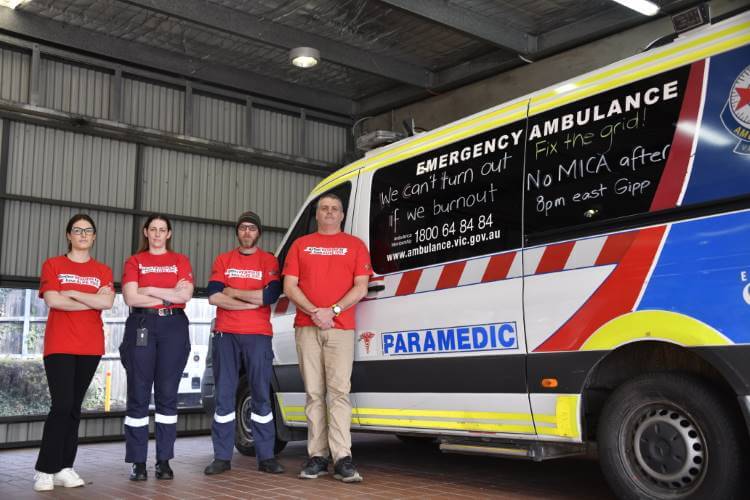Paramedics and ambulance workers have voted overwhelmingly in favour of escalating industrial action.
After more than 100 meetings, Victorian paramedics and ambulance workers still don’t have a deal that improves longevity in the job and work/life balance.
More than 97.5 per cent of members have voted to escalate industrial action and introduce 70 new work bans targeting every pocket of Ambulance Victoria where its members work.
When the Bairnsdale Advertiser sat down with local paramedics, the message was simple: better end of shift management, more resources, improved dispatching and a 24-hour Mobile Intensive Crew Ambulance (MICA) paramedic.
“We’re not seeking money, we’re not seeking big changes, we just want better end of shift care,” paramedic Stephen Hill said.
The paramedics explained the COVID-19 pandemic has played a significant role in the current ramping crisis, which in turn has caused resourcing issues.
“COVID caused a lot of nurses to leave, and it’s caused this bottleneck in the healthcare system,” paramedic Simon Alexander said.
Another problem for paramedics is incidental overtime (a shift between 10 and 14 hours), which has been blowing out to more than 14 hours.
“Ambulance Victoria is relying on incidental overtime more, it’s happening almost daily now whereas it used to be an anomaly,” Mr Alexander said.
The increase in incidental overtime has also led to more paramedics burning out at a faster rate, causing them to leave the industry in droves.
“The cumulative factors are what’s causing ambos to say ‘I’ve had enough’,” Mr Alexander said.
Taking a stance, Victorian Ambulance Union (VAU) members working in patient transport, communications centres, air ambulance, triage services, rosters department, management and education will be banning practices and refusing tasks in the areas they work in.
This includes refusing to utilise automated processes, bans on information collection and sharing across departments, bans on booking taxis, bans on training and competency sign offs, and bans on using digital systems for medication checks, tracking equipment, and deploying resources.
“Labor boasts its credentials on supporting ambos. Enterprise bargaining is where they need to put their money where their mouth is,” VAU secretary, Danny Hill, said.
“This campaign is about improving work/life balance and longevity in the job. It’s disappointing that paramedics need to escalate industrial action to get a fair result and improve their working lives.
“Ultimately paramedics want to reduce the amount of overtime they are forced to work every day. But Ambulance Victoria won’t let them go home, not because they are responding to emergencies, they are responding to low acuity cases or ramped for hours in hospital corridors.
“Over 97 per cent is a massive result that shows our members are united and prepared to escalate in order to get a fair deal.”
Actions will not affect the safety of the patients or the public.
They are carefully aimed at the massive amount of additional administrative duties that are put onto paramedics and ambulance workers who just want to respond to emergencies in the community.
IMAGE: Local paramedics Bec Adams, Gabby McDonald, Simon Alexander and Stephen Hill say the biggest change they want to see from Ambulance Victoria is an improvement to end of shift management to prevent paramedics from working exorbitant hours and burning out.













